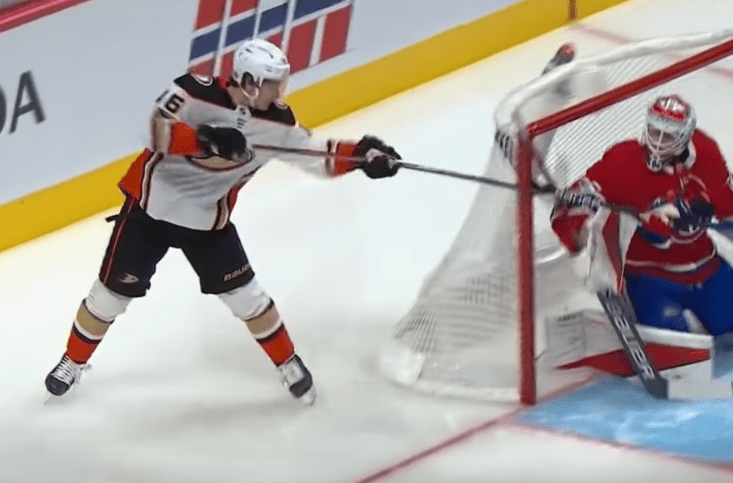Canadiens Trade Talk
Canadiens Pros And Cons Of Potential Trevor Zegras Trade

The Montreal Canadiens have several needs, but none more pressing than finding a sustainable source of offence to complement players like Nick Suzuki, Juraj Slafkovsky, and Cole Caufield.
Frank Seravalli recently reported that Anaheim Ducks may be open to a trade involving forward Trevor Zegras, and now Pierre LeBrun has confirmed the Canadiens have enquired about the talented forward.
“Sources say Verbeek has mentioned Zegras’ name in conversation with teams this season, though it remains unclear how far (if at all) those talks advanced. On one hand, it is a bit surprising given Zegras was on the cover of a video game, his infectious personality has been largely the face of the franchise, and he netted two 60-point seasons before the age of 21 on a team without much support,’ wrote Serevalli.
Zegras, 22, was involved in rather difficult contract negotiations this summer, which led to the talented centre missing training camp. The two parties finally agreed upon a three-year contract with an annual average value of $5.75 million.
If the Ducks are indeed interested in moving him, a team like the Canadiens would be foolish not to enquire about the availability, but it’s not a cut-and-dry situation.
Pros Of Trading For Zegras
Zegras fills a clear need in the Canadiens’ long-term rebuild. He’s a very creative forward who scored over 20 goals and 60 points in back-to-back campaigns (2021-22, 2022-23), and though his production has slowed this season, his shooting efficiency should normalize given that he’s still putting a lot of pucks on net.
Everything that could go wrong from an offensive standpoint has gone wrong, but he’s still scoring almost 0.7 goals per 60 minutes of 5v5 ice time, outpacing almost every player in the Canadiens’ lineup.
Zegras’ presence would also allow head coach Martin St-Louis to balance the lineup. As it stands, teams focus on shutting down the top line. It makes game planning against the Canadiens rather simple. Shut down the first line and you’re almost guaranteed a win.
Adding Zegras to the mix to play alongside someone like Kirby Dach would immediately make the Canadiens a much tougher team to play against. Zegras is also familiar with Caufield, as the two played together for the U.S. National Under-18 team.
Trevor Zegras doubled his season goal total last night with 2 goals, but the Zegras-Henrique-Terry line as a whole was dominant all night (which is not something many line combos in Anaheim can say this year). pic.twitter.com/CBr10zDGOm
— Josh Hutchinson (@JustJoshin41) January 8, 2024
Red Flags
Of course, the most important aspect of any trade is the cost, and in this case, there’s a possibility the Ducks may want to move on from Zegras during his down season, which could potentially lower his price tag.
On that note, Zegras would still command a healthy return regardless of his difficult season. Expect the Montreal Canadiens to have to offer at least a first-round pick as well as a high-end prospect to convince Anaheim a trade would make sense. If there’s a bidding war, the price could skyrocket, which is not the type of trade negotiations general manager Kent Hughes enjoys, as evidenced by the fact that Pierre-Luc Dubois ended up in Los Angeles rather than Quebec.
There’s also the injury issue, as Zegras was recently placed on the injured reserve due to a lower-body injury. This could also lead to a lower price tag once he’s ready to return to play, but there’s a risk that the Canadiens may end up with another forward who struggles with injuries, as has been the case with Dach.
And then there’s the perception that follows him around.
Zegras is incredibly confident and enjoys having fun on the ice, a lot like Caufield. Some may interpret this as arrogance. Strong leadership would put the issue to rest, and it’s important to remember talent should reign supreme in the NHL. They’re not going on a camping trip, after all. But there must be a certain level of trust within the players in the locker room.
ZEGRAS RETURNS TO THE LINEUP AND HITS THE MICHIGAN! 🥵 pic.twitter.com/3cqQyxwGTm
— NHL (@NHL) December 24, 2023
Brass Tacks
There’s a lot to like about acquiring a player like Zegras, but I’d argue he’s much closer to being an excellent add-on to a strong roster rather than a player you can build around.
Trading for Zegras would surely improve the team’s long-term ambitions, but it would not be the type of deal that would solve all the organizational weaknesses. He will also need a new contract in 2026, which could lead to another series of frustrating negotiations.
If the Ducks are willing to move Zegras for a reasonable return, the Montreal Canadiens have no choice but to explore the possibilities of adding him to the lineup, but it’s the type of trade that would come with several red flags.
A high-risk, high-reward situation.
Besides, given that talented players such as Zegras are rarely available on the NHL’s trade market, any hope for a discount is likely to be wishful thinking.










